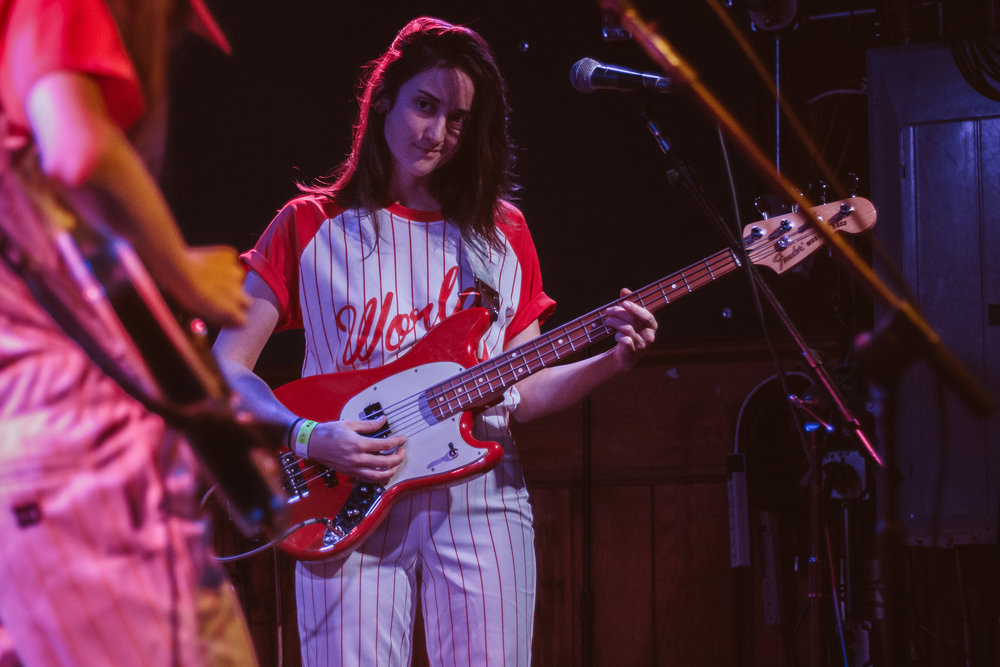
Faye Webster Brings Tight, Youthful Live Show to DC9

This isn’t from the night I saw her…I was too far back to get a good shot. The lighting looked kind of like this though (ANCHR Magazine)
If one trend has defined the last few years of indie rock, it’s been the rise of the under-25-year-old female singer/songwriter. From Snail Mail to Julien Baker to Soccer Mommy to Phoebe Bridgers to Lucy Dacus, the genre is chock full of young women who have put college on hold (or, in the case of Sidney Gish, worked around their studies) to put out records, tour the world, and plant their artistic flags. I’d have to imagine that the most challenging part of this experience is the touring bit; performing in front of a room of strangers is hard enough, and it can’t get much easier with the expectations a Fader cover story or a Best New Music tag foists upon an artist.
Indeed, the on-stage results have been mixed. I’ve seen Snail Mail twice, and, while their first show was pretty good, they failed to capture the power and immediacy of their recorded work when I saw them take the cavernous 9:30 Club stage. Conversely, Lucy Dacus’s set at the Black Cat a few months ago ranks among the best shows I’ve seen this year, and Sidney Gish’s stint opening for Petal and Camp Cope at Rock and Roll Hotel last year was among the most impressive, considering all she had at her disposal was her voice, her guitar, and a loop pedal. So what struck me about Faye Webster’s show at DC9 on Thursday night was how deftly the Atlanta singer/songwriter balanced her youthfulness with a tight live performance.
A photographer by trade, Webster has cannily curated her visual aesthetic to almost as fine a degree as her musical one. Decked out in visors and big slacks, Webster could be called “normcore” if the “norm” she imitates took place in the mid-20th century when her pet passions of baseball and yo-yos dominated leisure time and the stripes and pale pastels of her wardrobe seamlessly blended into the crowd. But her quirks come with a surprising level of street cred: the young Webster began her career at Atlanta hip-hop label Awful Records, and her photography portfolio includes portraits of Killer Mike, Offset, and high school friend Lil Yachty— work that makes for an eye-grabbing Instagram account.
Her music sounds like the sonic distillation of that platform, as well. The languid R&B grooves, steamy horns, and weeping steel pedal that populate 2019’s Atlanta Millionaires Club mix together in a sort of unspecifically nostalgic gauze, draping over Webster’s songs the way a filter might be put over one of her photos to give it a “vintage” look. But, where fuzzing up digital photography may have initially felt like hipster nonsense, Webster’s approach in both of her chosen mediums feels unpretentious.
Webster was only 12 when Instagram was first launched, so to her, these retro stylizations have never felt like reflections of the past, but images of her very real present. It’s no wonder that someone who came of age in an era when digital things were made to look analog chooses to reflect such an aesthetic in most of her work. What may have seemed like an affectation a few years ago now feels an inextricable part of a person’s identity, and that lends Webster an undeniable confidence that eclipses the otherwise absurdly Millenial/Gen Z image of an artist giving out her bandmate’s Instagram handles on stage and describing them as “lit.”
That confidence of purpose seeped into her performance as well, making for a very effective set. After teasing the audience by singing a few bars of the Father featuring “Flowers,” Webster and her band snapped into the groove of “Come to Atlanta,” which seemed to take hold of the crowd, who began asynchronously bobbing and swaying to the beat. I’ve been to a lot of concerts in my young life, and I’ve seen all kinds of music bring people together, but I don’t think there’s anything more universally appreciated than a cool, sturdy groove that can be bopped along too — it taps into something calming and emboldening, granting each of us “flow” and an unearned sense of confidence and swagger that eases most fo our fears of looking like a terrible dancer. The crowd stayed rapt to the rest of the music as well, which, despite the lack of horns in Webster’s live band, didn’t lose much of the appeal of the recorded version. If the brass section’s absence was felt anywhere, it was probably in “Hurst Me Too.” The slow crest of the chorus couldn’t gather enough momentum without horns and strings to have the intended impact, but other horn-heavy tracks like “Pigeon” and “Kingston” transitioned smoothly to the stage.
What wasn’t always as smooth was the transitions from song to song. They were disrupted by tunings, banter, and Webster’s charming gimmicks, which included accepting scratch-offs from the crowd and performing yo-yo tricks to a G-funk beat. The gimmicks were entertaining and impressive, but artists always seem to walk a fine line with stage banter; it seems to embolden the neediest idiots in the crowd to yell stuff at the stage and make themselves the center of attention. I’ve written about my relationship with annoying fans at length, so I won’t dwell on that point, but I will say, when an artist asks for requests, hear’s one, says she’s going to play it, and you keep shouting out song names, you’re not being entertaining. You’re being a massive dick.
“Jonny,” the final song of the night, was also the most impressive, in terms of both sound and pure stage presence. Dropping her guitar and staring wistfully towards the ceiling, hand over her heart as if she was taking an oath, Webster led her band through a song that felt symphonic even without the full production of it’s recorded version, bringing a dose of very real passion to a night that was otherwise filled with jokes and irony. When the band came back on stage to play the encore, they struck up “Jonny” again, and Webster recited the poem from “Jonny (Reprise)” before just kind of swaying with the rest of her group as they slipped into the coda. If this were a TV show, it’d be the moment where the camera pulls out to a slight overhead shot and the credits begin to r0ll, gently rocking the audience back to real life. It was the kind of outro that reminds us that we’re unlikely to find such grace and beauty in the everyday world, but also lets us think, that somewhere out there, something perfect is in fact happening.